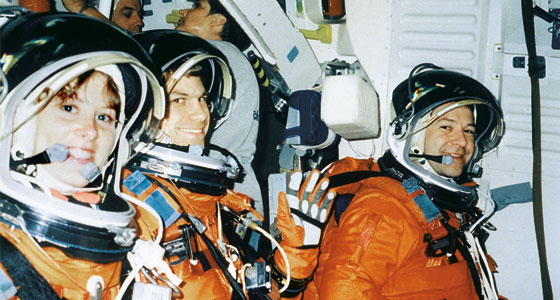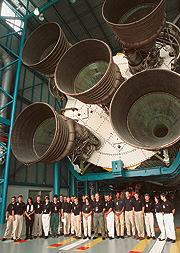
Caldwell, left, was proud to pass her souvenir pacifier on to the new youngest astronaut in the space program, saying it had been tough to be the rookie.
Her work is with the Russian space agency and a space contractor that produces equipment used by both the astronauts and cosmonauts, such as com-puter interfaces, procedure manuals and schematics. All the materials are produced in Russian and after they are translated into English, Caldwell scrutinizes everything to maintain quality control.
A big part of working in Russia is developing personal relationships, Caldwell says. "Much of my time is spent getting to know these folks as well as learning their culture and trying to integrate myself without becoming too un-American." In working with them, she has learned that the Russians take a much broader view of the world than do her countrymen.
"They have their way of doing things. They've been in this endurance race longer than we have," she observes. "We're good at short missions. We're good at getting a lot of stuff done in a short timeline and getting things accomplished. The Russians are better with the long-term stuff. We're learning from them in this cooperative effort.
"They want a more simplistic approach. We try to complicate everything. Their concept of time is much different than ours. They have a history that's much longer than ours."
She uses an example based on her own experiences of developing friendships with Russians, which takes more effort than it does with Americans. "If I was meeting with a friend and a friend was 15 minutes late, I would think I was stood up. To a Russian, if you were 45 minutes late, they would think, 'what has happened to my friend? I hope my friend is OK. I think I'll sit here another 15 minutes to see if my friend shows ups.'"
You go through a lot to earn a friendship with a Russian, Caldwell says, but when you do, "it's the sweetest thng. It's something you are locked on forever. you can count on them, as long as you don't do them wrong."

